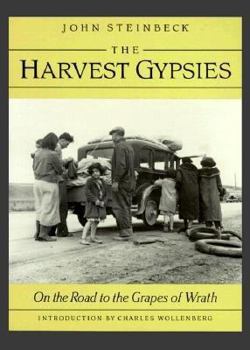The Harvest Gypsies: On the Road to the Grapes of Wrath
Select Format
Select Condition 
Book Overview
Selected by NYU as one of the century's best books of American journalism.Gathered in this volume are seven long-form articles that John Steinbeck wrote in 1936 for The San Francisco News about the... This description may be from another edition of this product.
Format:Paperback
Language:English
ISBN:093058838X
ISBN13:9780930588380
Release Date:October 1996
Publisher:Heyday Books
Length:80 Pages
Weight:0.35 lbs.
Dimensions:0.2" x 5.9" x 8.0"
Customer Reviews
3 ratings
A selection of seven articles that Steinbeck wrote in 1936
Published by Thriftbooks.com User , 21 years ago
Readers seeking a full experience of John Steinbeck's literary style won't want to miss Harvest Gypsies, a selection of seven articles that Steinbeck wrote in 1936 about the plight of migrant farmworkers during the Dust Bowl migration. Black and white photos accompany his report on conditions and experiences, weaving a masterful selection of insights which go beyond history into personal observation.
Was It Really A Novel?
Published by Thriftbooks.com User , 24 years ago
Were the "Grapes of Wrath" published today, it may like other recent books, have been classified as historical fiction as opposed to a novel. I am thinking specifically of "Artemisia" that was published as both in different countries. How the work is classified is not critical, as either way it is one of the finest pieces of literature that has been written, and for many people, Steinbeck's finest work."The Harvest Gypsies" is a collection of 7 articles that Mr. Steinbeck wrote as a journalist. All were concerned with the issues he dealt with in the resulting book. This small volume is greatly enhanced by the photographs of Dorothea Lange, and the introduction of Charles Wollenberg.One of the people the book was dedicated to was "Tom", actually Tom Collins, who was a manager of a federal migrant labor camp in California. The lines of fact and fiction are eventually blurred with him, as Tom Collins was the model for the character of "Jim Rawley" manager of "The Wheatpatch Camp" in "The Grapes Of Wrath". Ms. Lange's photographs could have been illustrations for Mr. Steinbeck's book, for when viewing them you can pick out the faces that could have accounted for the members of Steinbeck's epic.This is a very brief book, but it portrays the migratory farm workers lives, as being even worse, if that can be imagined. A novel always offers the ultimate refuge of being fiction; these 7 articles and their photographs take away that solace. The brutality, random murder, and disease that was rampant, and the State of California that allowed the behaviors, are atrocious. In the context of one of the writings, one of the large growers who sanctioned the killing and starvation that was part of the agriculture industry stated that, "without a peon population the economy of California could not function". Steinbeck takes this statement of arrogance and ignorance, that is routinely spoken by any exploiter, and logically demonstrates that were this indeed the case, the state could no longer exist. For were it to continue to exist with its fascist policies, the most basic of Democratic rights would have to be absented.Milk, that played so prominent a role in the book is spoken of extensively in the articles. Many of the most painful parts of the book were so common in reality, that the book may seem mild at times.No matter how many times you have read the book, once this collection of articles are read, the experience of the book will not only change, I believe it will be enhanced.
. . .a prerequisite to In Dubious Battle. . .
Published by Thriftbooks.com User , 25 years ago
Three of Steinbeck's social novels--In Dubious Battle, The Grapes of Wrath, and Of Mice and Men--are enhanced after reading this work. This work is the prelude to three of Steinbeck's most socially poweful novels. To fully understand what Steinbeck is striving to accomplish with Battle and Wrath, and to fully round out your history/literature lesson, it is essential to understand something about the socialist movement--birth of communisim--and the general exploitation of the fruit-pickers of California. The big businesses of that day, not much different from various big businesses of today, treated employees like machines--replacing them as needed--after being hurt on unsafe equipment, etc.--without regarding their well-being, or considering the hungry mouths of their families. The Harvest Gypsies is a crutial text in the study of California before uniouns began revolting against the machine.






